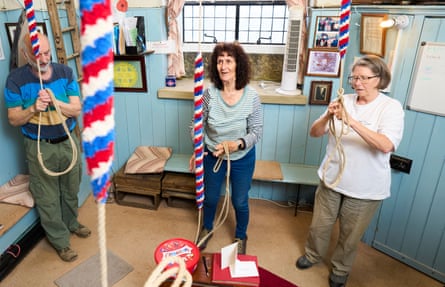One sunny August evening, Jean Walters was sitting in her garden in Meltham, West Yorkshire, when the church bells began to ring. She sipped her glass of wine; the evening seemed idyllic. “A quintessential English country garden,” she thought, and posted on Facebook: “Bells ringing, how lovely!”
The next day when the plumber came to fix her toilet, more prosaically, he mentioned that he had seen her post, and being a bellringer himself, gave her the number of the local church’s tower captain. “He said, ‘Come along and try it.’ I did. I loved it. I said to my husband, ‘Did you hear that single bong? That was me.’”
Walters was 67 when she first climbed the tower at St Bartholomew’s in Meltham. “And I knew immediately it was something that I could develop and would be good for me.” Just before her 70th birthday, she rang her first quarter peal – nonstop ringing without a mistake for 45 minutes – and earned her badge to become a full member of the Yorkshire bellringers’ association.
Walters is 80 now, and to celebrate her milestone birthday, she rang eight different “methods” – as the pattern that determines ringing position is called – one for each decade. From the start, she says, “I just loved the idea that I was making this big noise in Meltham.”
Making a noise was something Walters had always done, as a lifelong singer and member of choirs, and as a primary school teacher. Initially a top soprano, she later “went down to a contralto”, but continued to sing for the Huddersfield Choral Society, auditioning every three years to keep her place. Then, a few months before she heard the bells in her garden, three decades of teaching caught up with her and her voice went. “It just packed up,” she says. “Suddenly there was this part of me missing.” She sometimes speaks with a croaky edge, but the bells have given her a different voice. “I just love the sound of bells,” she says.
She first heard them aged five, from her bedroom in Tottenham, north London. Walters’ mother was a housewife and her father a waiter. Every evening at 7pm, she would be sent to bed. “And I’d hear the bells. To me it’s the sound of comfort: going to sleep in my bedroom and being secure in my house.”

Walters walks and gardens, but bellringing presents a different physical challenge. “You have to control your bell: stand up straight, your arms up straight, then back down. It’s a workout.” The longer the rope, the harder it is to ring. “If I’ve got a bad back, a dose of bellringing straightens it out. After ringing, I feel exhilarated.” Her favourite bell weighs 5.5 hundredweight (280kg).
Walters has congenital heart disease. At 18 she was told she had a tiny hole in her heart. At 58, feeling tired, she saw a specialist who informed her: “You’ve got a grossly enlarged heart and you’ve got five holes in it.” She had open-heart surgery, lasting more than five hours. At the cardiac rehab classes, she remembers: “There were all these older people who had had triple heart bypasses. I couldn’t keep up. And I realised how unfit I was.” Ringing isn’t only a test of strength, but a proof of it.
“I’ve always wanted challenges,” she says. “But you’re taught. They’re very patient, the other bellringers. You don’t have to be musical – just be able to count and have a sense of rhythm.” Learning the methods requires focus; ringing improves balance. And: “It’s social … You have a laugh, a chat, you ring the bells – and afterwards you go to the pub.
“It’s a very close community. We go to other towers and help out for weddings. I can go anywhere in the world where they’ve got English bells and say, ‘Hi, I’m a qualified bellringer’ … I’ve rung bells in Dorset, Devon, Gloucestershire and all over West Yorkshire.”
After singing, bellringing became for Walters “another way of expressing my joy of living”. When she can no longer do that, “I know I will discover something else”. Not that she plans to stop. “I’m aiming for 90. The thing about bellringers,” she says, “is they accept you as you are.”

 3 months ago
57
3 months ago
57

















































